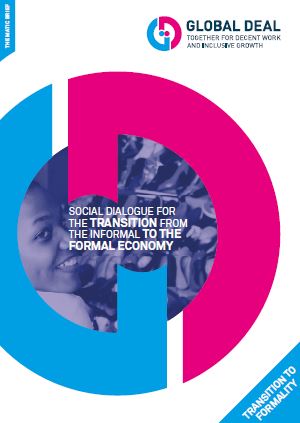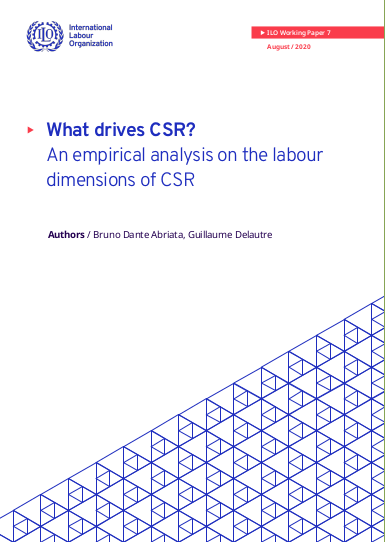Publications on freedom of association
November 2020
-

Global Deal for Decent Work & Inclusive Growth - Thematic Brief
Social Dialogue for the Transition from the Informal to the Formal Economy
20 November 2020
Social dialogue has a vital role to play in supporting the transition from the informal to the formal economy. Drawing on case studies from around the world, this Global Deal thematic brief illustrates how social dialogue, involving governments and representative employers’ and workers’ organizations has, in different ways and at different levels, contributed to the transition to formality and the reduction of decent work deficits in the informal economy. It aims to assist all concerned stakeholders to apply social dialogue for the design and implementation of effective formalization strategies, in the context of the Sustainable Development Agenda 2030 and the relevant international labour standards.
-
Publication
Frequently asked questions - Issue paper on COVID-19 and fundamental principles and rights at work
16 November 2020
-
EU - ILO comparative review
Facilities for trade union officials and members to exercise their rights – A comparative review
13 November 2020
The report seeks to highlight the common denominator of the two main issues which will be analysed: the right to organize, id est the right to form and join organizations of workers or employers, and the facilities granted to workers’ representatives. The former is of a more fundamental nature (freedom of assembly, non-discrimination and non-interference), whereas the latter (facilities) is more technical. The countries which will be examined are the following: Belgium, Denmark, France, Germany, Italy, Spain and Sweden.
-
EU - ILO comparative review
Individual and collective dispute resolution systems - A comparative review
13 November 2020
The present report investigates specific individual and collective labour dispute resolution practices and institutions in a selected sample of countries: Australia, Belgium, France, Spain, Sweden and the United Kingdom. The countries were selected to reflect broadly different legal and industrial relations systems with diverse forms and traditions of dispute resolution.
-
EU - ILO report
Policy recommendations on individual and collective dispute resolution systems and facilities for trade union officials and members to exercise their rights
13 November 2020
These policy recommendations address some areas of possible changes in the Greek labour law framework that could modernise dispute settlement systems on the one hand, and facilities for trade union officials and members in Greece on the other. They are formulated in response to specific queries and comments received from the Greek government and the social partners.
October 2020
-

Fundamental principles and rights at work
Issue paper on COVID-19 and fundamental principles and rights at work
07 October 2020
For the millions of workers already in vulnerable situations, the COVID-19 crisis can have devastating consequences: their fundamental rights at work are under threat, pushing them and their families towards greater insecurity. Safeguarding and extending fundamental principles and rights at work will therefore be critical to the success of both immediate and longer-term responses to the crisis in the world of work.
-
Country Baselines
2019 Annual Review under the follow-up to the ILO 1998 Declaration - Compilation of baseline tables, by country
07 October 2020
(based on the reports of Member States that have not ratified all fundamental Conventions and/or that have not ratified the Protocol of 2014 to the Forced Labour Convention, 1930)
August 2020
-

ILO Working paper 7
What drives CSR? An empirical analysis on the labour dimensions of CSR
05 August 2020
Relying on the data provided by an ESG rating agency, this paper aims at bringing more understanding on the diversity of firms’ behaviours in terms of labour related CSR and filling a gap on the potential role of labour market institutions, including workers’ collective rights, to contribute to an effective CSR policy.
-
Publication
Qatar - Country baselines under the ILO Declaration (2000-2019)
05 August 2020
-
Publication
New Zealand - Country baselines under the ILO Declaration (2000-2019)
05 August 2020